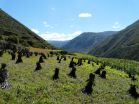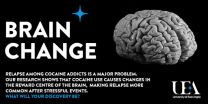INFORMATION:
Closing the Case on an Ancient Archeological Mystery
Solving 4,000-year-old mystery helps WSU archeologist find useful resource for a warmer future
2015-04-29
(Press-News.org) PULLMAN, Wash.--Climate change may be responsible for the abrupt collapse of civilization on the fringes of the Tibetan Plateau around 2000 B.C.
WSU archaeologist Jade D'Alpoim Guedes and an international team of researchers found that cooling global temperatures at the end of the Holocene Climatic Optimum, a 4,000 year period of warm weather, would have made it impossible for ancient people on the Tibetan Plateau to cultivate millet, their primary food source.
Guedes' team's research recently was published online in the Proceedings of the National Academy of Sciences. Her results provide the first convincing explanation for why the area's original inhabitants either left or so abruptly changed their lifestyles.
They also help explain the success of farmers who practiced wheat and barley agriculture in the region 300 years later.
Unlike millet, wheat and barley have high frost tolerance and a low heat requirement, making them ideally suited for the high altitudes and cold weather of eastern Tibet. Guedes argues this made the two crops an important facet of subsistence immediately after their introduction around 1700 B.C.
"Wheat and barley came in at the opportune moment, right when millets were losing their ability to be grown on the Tibetan Plateau," Guedes said. "It was a really exciting pattern to notice. The introduction of wheat and barley really enabled Tibetan culture to take the form it has today, and their unique growth patterns may have played a crucial rule in the spread of these crops as staples across the vast region of East Asia."
One offshoot of the research: The ancient millet seeds that fell out of cultivation on the Tibetan Plateau as the climate got colder might soon be useful again as the climate warms up.
"Right now, these millets have almost become forgotten crops," Guedes said. "But due to their heat tolerance and high nutritional value, they may be once again be useful resources for a warmer future."
An archaeological enigma
At Ashaonao, Haimenkou, and other archeological sites in the Tibetan highlands, researchers for years had noticed a growing trend. An abundance of ancient wheat and barley seeds found at the sites suggested the crops rapidly replaced millet as the staple food source of the region during the second millennium BCE.
The findings were puzzling considering that the scientific consensus of the time was the region's climate would have actually favored millet, due to its shorter growing season, over wheat or barley.
The conundrum intrigued Guedes so she dove into the agronomy literature to investigate. She found agronomists tended to use a different measurement than archaeologists to determine whether crops can grow in cold, high altitude environments like the Tibetan Plateau. They used total growing degree days or the accumulated amount of heat plants need over their lifetime rather than the length of a growing season.
"My colleagues and I created a new model based off what we found in the literature," Guedes said. "It revealed that global cooling would have made it impossible to grow millet in the Eastern Tibetan Highlands at this time but would have been amenable to growing wheat and barley. Our work turned over previous assumptions and explained why millet is no longer a staple crop in the area after 2000 BCE."
Guedes' work points to climate cooling as the culprit behind the collapse of early civilization on the Tibetan Plateau. Ironically, the region is today one of the areas experiencing the most rapid climate warming on the planet. There are some areas in the southeastern plateau where temperatures are 6 degrees Celsius higher than they were 200 years ago.
Rapid temperature increase is making it difficult for the region's inhabitants to raise and breed yaks, a staple form of subsistence in the central Asian highlands, and grow cold weather crops, once again endangering their survival.
"So now we have a complete reversal and climate warming is having a big impact on the livelihood of smaller farmers on the Tibetan Plateau," Guedes said.
ELSE PRESS RELEASES FROM THIS DATE:
Improving the effect of HIV drugs by the use of a vaccine
2015-04-29
A vaccine containing a protein necessary for virus replication can boost an HIV-infected patient's immune system, according to clinical research published in the open access journal Retrovirology. This boost can result in increased effectiveness of antiretroviral drugs.
When people are first diagnosed with HIV they are put on antiretroviral drugs, also known as highly active antiretroviral therapy (HAART). These drugs can stop the virus reproducing almost completely. When taking HAART, however, it is known that the virus can still replicate at low levels and accumulate ...
Pneumonectomy or lobectomy?
2015-04-29
For patients in the early stage of non-small cell lung cancer, surgical resection yields optimal outcomes. Prior investigations have shown that different resection procedures have very different outcomes, with pneumonectomy associated with three-fold higher mortality than other resection types. While it is understandable that pathological and physiological factors influence a surgeon's choice of surgery for a particular patient, the results presented in this study suggest that physician discomfort with the operative complexities of a procedure may lead to selection of a ...
Simple, active intervention program after major thoracic surgery reduces ER visits and saves money
2015-04-29
Hospital readmission rates after major thoracic surgery can run as high as 10-17%. Alarmingly, readmission after pulmonary resection for lung cancer has been associated with worse outcomes, including higher mortality. Thus, reducing readmissions after thoracic surgery can both save lives and reduce healthcare costs. Studies in internal medicine and cardiology have shown that programs that improve the transition from hospital to post-discharge care can be effective in decreasing emergency room visits and re-hospitalization. This study from McMaster University describes for ...
Chronic obstructive pulmonary disease increases the risk of sudden cardiac death
2015-04-29
People suffering from the common lung disease, chronic obstructive pulmonary disease (COPD), have an increased risk of sudden cardiac death (SCD), according to new research published online today (Wednesday) in the European Heart Journal [1].
When compared with people of the same age and sex who do not have the disease, those with COPD have a 34% increased risk of SCD overall, but their risk almost doubles more than five years after first being diagnosed with COPD. In COPD patients who have frequent exacerbations (sudden worsening of their symptoms, such as shortness ...
Coastal light pollution disturbs marine animals, new study shows
2015-04-29
Marine ecosystems can be changed by night-time artificial lighting according to new research published in the Royal Society journal Biology Letters. The results indicate that light pollution from coastal communities, shipping and offshore infrastructure could be changing the composition of marine invertebrate communities.
Researchers from the Universities of Exeter and Bangor used a raft in the Menai Strait to monitor how artificial light at night affects the settlement of marine invertebrates into new habitats. Light is an important cue which guides the larvae of marine ...
Research prompts rethink of enzyme evolution
2015-04-29
New research by scientists at New Zealand's University of Otago suggests a need for a fundamental rethink of the evolutionary path of enzymes, the proteins vital to all life on Earth.
Enzymes catalyse a vast array of biologically relevant chemical reactions even in the simplest living cells.
Biochemist Dr Wayne Patrick says that people tend to imagine evolution as a slow and steady march from barely functional life forms in the primordial soup, towards a modern-day pinnacle of near perfection.
"When it comes to enzyme evolution, this is also the textbook version ...
Two-thirds of bowel cancer patients aren't advised to exercise despite health benefits
2015-04-29
MORE than two-thirds (69 per cent) of bowel cancer patients say they weren't advised to exercise regularly after their diagnosis - despite evidence that brisk physical activity is linked to better survival in bowel cancer, according to a Cancer Research UK study published today (Wednesday) in BMJ Open.
The research, from the Cancer Research UK Health Behaviour Research Centre at UCL (University College London), is the largest study of its kind. More than 15,000 bowel cancer patients* were asked about their current level of physical activity and whether they were advised ...
UK coalition government derailed efforts to reduce salt in food
2015-04-29
The coalition government derailed a successful programme that reduced salt content added to foods by industry, argue experts in The BMJ this week.
A poor diet is the leading cause of death and disability in the UK and worldwide. Large amounts of salt, for example, are added to food by industry and eating too much can raise blood pressure, a major factor associated with strokes, heart failure and heart attacks.
The UK's Food Standards Agency (FSA), established in 2000, became a "world leader" in improving nutrition and pioneered a salt reduction programme by working ...
Make calorie labels compulsory on all alcoholic drinks, says public health expert
2015-04-29
Calorie counts should be mandatory on all alcoholic drinks as a matter of urgency, argues a leading public health doctor in The BMJ this week.
Fiona Sim, Chair of the Royal Society for Public Health, says alcoholic drinks contribute to obesity and the law "should require restaurant menus and labels to make energy content explicit in addition to alcohol content."
She explains that, since 2011, packaged foods in the European Union have been subject to regulation requiring labelling with their ingredients and nutritional information, including energy content (calories). ...
Cocaine changes the brain and makes relapse more common in addicts
2015-04-29
Cocaine use causes 'profound changes' in the brain that lead to an increased risk of relapse due to stress - according to new research from the University of East Anglia.
New research published today in The Journal of Neuroscience identifies a molecular mechanism in the reward centre of the brain that influences how recovering cocaine addicts might relapse after stressful events.
Importantly, the study identifies a potential mechanism for protecting against such relapses with treatment.
The research team looked at the effects of cocaine in rat brain cells (in vitro) ...
LAST 30 PRESS RELEASES:
ASU researchers to lead AAAS panel on water insecurity in the United States
ASU professor Anne Stone to present at AAAS Conference in Phoenix on ancient origins of modern disease
Proposals for exploring viruses and skin as the next experimental quantum frontiers share US$30,000 science award
ASU researchers showcase scalable tech solutions for older adults living alone with cognitive decline at AAAS 2026
Scientists identify smooth regional trends in fruit fly survival strategies
Antipathy toward snakes? Your parents likely talked you into that at an early age
Sylvester Cancer Tip Sheet for Feb. 2026
Online exposure to medical misinformation concentrated among older adults
Telehealth improves access to genetic services for adult survivors of childhood cancers
Outdated mortality benchmarks risk missing early signs of famine and delay recognizing mass starvation
Newly discovered bacterium converts carbon dioxide into chemicals using electricity
Flipping and reversing mini-proteins could improve disease treatment
Scientists reveal major hidden source of atmospheric nitrogen pollution in fragile lake basin
Biochar emerges as a powerful tool for soil carbon neutrality and climate mitigation
Tiny cell messengers show big promise for safer protein and gene delivery
AMS releases statement regarding the decision to rescind EPA’s 2009 Endangerment Finding
Parents’ alcohol and drug use influences their children’s consumption, research shows
Modular assembly of chiral nitrogen-bridged rings achieved by palladium-catalyzed diastereoselective and enantioselective cascade cyclization reactions
Promoting civic engagement
AMS Science Preview: Hurricane slowdown, school snow days
Deforestation in the Amazon raises the surface temperature by 3 °C during the dry season
Model more accurately maps the impact of frost on corn crops
How did humans develop sharp vision? Lab-grown retinas show likely answer
Sour grapes? Taste, experience of sour foods depends on individual consumer
At AAAS, professor Krystal Tsosie argues the future of science must be Indigenous-led
From the lab to the living room: Decoding Parkinson’s patients movements in the real world
Research advances in porous materials, as highlighted in the 2025 Nobel Prize in Chemistry
Sally C. Morton, executive vice president of ASU Knowledge Enterprise, presents a bold and practical framework for moving research from discovery to real-world impact
Biochemical parameters in patients with diabetic nephropathy versus individuals with diabetes alone, non-diabetic nephropathy, and healthy controls
Muscular strength and mortality in women ages 63 to 99
[Press-News.org] Closing the Case on an Ancient Archeological MysterySolving 4,000-year-old mystery helps WSU archeologist find useful resource for a warmer future



